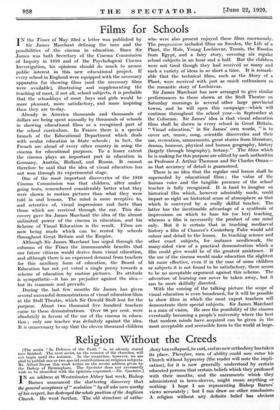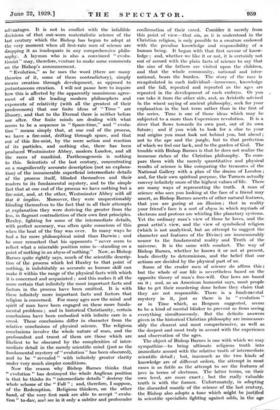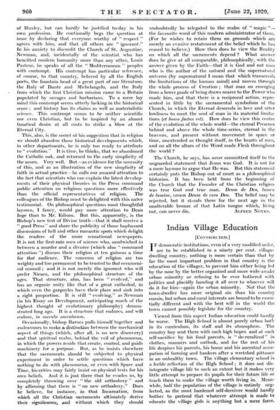Religion Without the Creeds
[The series " In Defence of the Faith " is, as already stated now finished. The next series, on the reunion of the churches, will not begin until the autumn. In the meantime, however, we are glad to publish one or two special contributions on religious subjects. Mr. Alfred Noyes this week writes on the recent address given by the Bishop of Birmingham. The Spectator does not necessarily wish to be identified with the opinions expressed.—En. Spectator.] IN an address at Westminster Abbey last week, Bishop .11- Barnes announced the shattering discovery that the general acceptance of " evolution " by all who were worthy of his respect, has destroyed the whole position of the Anglican Church. He went further. The old structure of ortho- ,doxy has collapsed, he said, and no new orthodoxy hastaken its place. Therefore, men of ability could now enter his Church without hypocrisy (the reader will note the impli- cation), for it is now generally understood by certain educated persons that certain beliefs which they professed with their mouths, and the sacraments which they administered in lawn-sleeves, might mean anything or nothing. I hope 'I am representing Bishop Barnes' views accurately ; but I can draw no other conclusion. A religion without any definite belief has obvious advantages. It is not in conflict with the infallible decisions of that out-worn materialistic science of the last century which the Bishop has begun to adopt at the very moment when all first-rate men of science are dropping it as inadequate in any comprehensive philo- sophy. A layman who is also a convinced " evolu- tionist" may, therefore, venture to make some comments on the Bishop's announcement.
" Evolution," as he uses the word (there are many theories of it, some of them contradictory), simply means creation through development, as opposed to instantaneous creation. I will not pause here to inquire how this is affected by the apparently unanimous agree- ment of all the leading modern philosophers and exponents of relativity (with all the greatest of their predecessors) that our finite ideas of " Time " are illusory, and that to the Eternal there is neither before nor after. Our finite minds are dealing with what seems to be a sequence in " Space-time," and " evolu- tion " means simply that, at one end of the process, we have a fire-mist, drifting through space, and that out of this fire-mist, by the mere action and reaction of its particles, and nothing else, there has been produced Westminster Abbey, modern London, and all the races of mankind. Parthenogenesis is nothing to this. Scientists of the last century, concentrating on a magnificently accurate description (not an explana- tion) of the innumerable superficial intermediate details of the process itself, blinded themselves and their readers to its fundamental mystery, and to the simple fact that at one end of the process we have nothing but a fire-mist, and, at the other, Westminster Abbey with all that it implies. Moreover, they were unquestionably blinding themselves to the fact that in all their attempts at explanation they were deriving the greater from the less, in flagrant contradiction of their own first principles. Huxley, fighting for some of the intermediate details, with perfect accuracy, was often quite conscious of this when the heat of the fray was over. In many ways he had a far more philosophical mind than Darwin ; and he once remarked that his opponents " never seem to reflect what a miserable position mine is—standing on a point of nothing in an abyss of nothing." Now, as Bishop Barnes quite rightly says, much of the scientific descrip- tion of the process which led Huxley to that point of nothing, is indubitably as accurate as human skill can make it within the range of the physical facts with which it is concerned and acquainted ; and this makes it all the more certain that infinitely the most important facts and factors in the process have been omitted. It is with these infinitely more important facts ' and factors that religion is concerned. For many ages now the mind and spirit of man have been engaged on these more funda- mental problems ; and in historical Christianity, certain conclusions have been embodied with infinite care in a creed. These conclusiOns differ in character from the relative conclusions of physical science. The religious conclusions involve the whole nature of man, and the profoundest and truest of them are . those which are likeliest to be obscured by the complexities of inter- mediate detail in the merely scientific mind (just as the fundamental mystery of "evolution" has been obscured), and to be " revealed " with infinitely greater clarity under very much simpler conditions.
Now the reason why Bishop Barnes thinks that evolution " has destroyed the whole Anglican position is that ho thinks its " intermediate details " destroy the whole scheme of the Fall " ; and, therefore, I suppose, of the Redemption. Religious thinkers, on the other 'hand, of the very first rank are able to accept evolu- tion " to-day, and see in it only a subtler and profounder confirmation of their creed. Consider it merely from this point of view—that sin, as it is understood in the Christian religion, is only possible to a creature endowed with the peculiar knowledge and responsibility of a human being. It began with that first savour of know- ledge ; and, whether we like it or not, it is certainly not out of accord with the plain facts of science to say that the sins of the fathers are visited upon the children, and that the whole community, national and inter- national, bears the burden. The story of the race is recapitulated in each individual—innocence, knowledge and the fall, repeated and repeated as the ages are repeated in the development of each embryo. Or you can take it from the other side, and, as Aristotle advised in the wisest saying of ancient philosophy, seek for your explanation in the last term rather than in the first of the series. Time is one of those ideas which may be subjected to a more than Copernican revolution. It is a river that flows towards its own past, out of its own future; and if you wish to look for a clue to your real origins you must look not behind you, but ahead ; not to the ape and the jungle, but to that perfection of which we feel our lack, and to the garden of God. The trouble with Bishop Barnes is that he does not realize the immense riches of the Christian philosophy. To com- pare them with the merely quantitative and physical results of science is like comparing the treasures of the National Gallery with a plan of the drains of London ; and, for their own spiritual purpose, the Turners actually convey infinitely more of the highest values of life. There are many ways of representing the truth. A man of science who sees you looking at the face of a friend may assert, as Bishop Barnes asserts of other natural features, that you are gazing at an illusion ; that in reality your friend's face is a sort of abyss in which myriads of electrons and protons are whirling like planetary systems.
Yet the ordinary man's view of those he loves, and the great artist's view, and the view of symbolical religion (which is not analytical, but an attempt to suggest the character and features of the Divine) are immeasurably nearer to the fundamental reality and Truth of the universe. It is the same with conduct. The way of Bishop Barnes, whether he knows it or not at present, leads directly to determinism, and the belief that our actions are decided by the physical part of us.
Some of the cruder men of science do affirm this ; but the whole of our life is nevertheless based on the opposite theory of man's free-will. Our laws are based on it ; and, as an American humorist says, most people like to get their murdering done before they claim that they are not responsible. There is a fundamental mystery in it, just as there is in " evolution " or in Time which, as Bergson suggested, seems to be a kind of mental blinker to prevent us from seeing everything simultaneously. But the definite answers given in the historical Christian philosophy are immeasur- ably the clearest and most comprehensive, as well as the deepest and most truly in accord with the experience and observation of the ages.
The object of Bishop Barnes is one with which we may sympathize—to bring ultimate religious truth into immediate accord with the relative truth of intermediate scientific detail ; but, inasmuch as the two kinds of knowledge are of different orders, the attempt in most cases is as futile as the attempt to see the features of love in terms of electrons. The latter terms, on their own level, are more exact ; but the really valuable truth is with the former. Unfortunately, in adopting the discarded mantle of the science of the last century, the Bishop also adopts a tone which might be justified in scientific specialists fighting against odds, in the age of Huxley, but can hardly be justified to-day in his own profession. He continually begs the question at issue by declaring that everyone worthy of " respect " agrees with him, and that all others are " ignorant." In his anxiety to discredit the Church of St. Augustine, Newman, and, incidentally of the scientist who has benefited modern humanity more than any other, Louis Pasteur, he speaks of all the " Mediterranean " peoples with contempt. His contempt has particular reference, of course, to that country, beloved by all the English poets, the fountain head of a great part of our literature, the Italy of Dante and Michelangelo, and the Italy from which the first Christian mission came to a Britain populated by savages and barbarians. To a mere lay mind this contempt seems utterly lacking in the historical sense ; and history has its claims as well as materialistic science. This contempt seems to be neither scientific nor even Christian, but to be inspired by an almost fanatical desire at all costs to strike a blow at the Eternal City.
This, also, is the secret of his suggeStion that in religion we should abandon those historical developments which, in other departmentS, he is only too ready to attribute to " evolution." It is time, he thinks, that we abandoned the Catholic oak, and returned to the early simplicity of the acorn. Very well. But—as evidence for the necessity of this, and as an illustration of the new simplicity of faith in actual practice—he calls our amazed attention to the fact that scientists who can explain the latest develop- ments of their physical theories in the Press command public attention on religious questions more effectively than the official representatives of religion.' The colleagues of the Bishop must be delighted with this naive testimonial. On philosophical questions most thoughtful laymen, I fancy, would pay more attention to Dean Inge than to Mr. Edison. But this, apparently, is the Bishop's new test of Divine truth—that it shall receive a " good Press" and share the publicity of those haphazard discussions of hell and other romantic spots which delight the readers of the more sensational newspapers. It is not the first-rate men of science who, sandwiched in between a murder and a divorce (which also " command attention ") discuss their religion at ten guineas a time for that audience. The concerns of religion are too weighty and too permanent to be trusted to that oecumeni- cal council ; and it is not merely the ignorant who will prefer Nicaea, and the philosophical structure of the ages. That structure, also, has been " evolved," and has an organic unity like that of a great cathedral, in which even the gargoyles have their place and sink into a right proportion. It is still " evolving," as Neiman (in his Essay on Development, 'anticipating much of the highest thought of evolutionary philosophy) demon- strated long ago. It is a structure that endures, and will endure, in saecula saeeulorum.
Occasionally, bishop Barnes pulls himself together and endeavours to make a distinction between the mechanical aspect of things (which, after all, is no new discovery) and that spiritual realm, behind the veil of phenomena, in which the powers reside that create, control, and guide machinery for a purpose. But, as he insists elsewhere that the sacraments should be subjected to physical experiment in order to settle questions which have nothing to do with phenomena, or even with Space and Time, his critics may fairly insist on physical tests for his own beliefs. And it is just there that he evades us, by completely throwing over " the old *orthodoxy " and by affirming that there is " no new orthodoxy." Does he believe, for instance, in • that Incarnation, from which all the Christian sacraments ultimately derive their signifieance, and without which they should undoubtedly be relegated to the realm of " magic "— the favourite word of this modern administrator of them. (For he wishes to retain them on grounds which are merely an evasive restatement of the belief which he has ceased to believe.) How then does he view the Reality on which all the sacraments depend ? What answer does he give at all comparable, philosophically, with the answer given by the Faith—that it is God and not man who is the author of the natural and the supernatural universe (by supernatural I mean that which transcends the limitations of the human mind) and moves through the whole process of Creation ; that man on emerging from a lower grade of being draws nearer to the Power who made him, and that there is a reciprocal action, repre- sented in little by the sacramental symbolism of the Church, in which the Eternal descends in love and utter lowliness to meet the soul of man in its material limita- tions (et homo factus es-t). How does he view this centre of the evolution of the whole world—the eternal Presence behind and above the whole time-series, eternal in the heavens, and present without movement in space or time, unextended as thought itself, in the hearts of men, and on all the altars of the Word made Flesh throughout the world ?
The Church, he says, has never committed itself to the unguarded statement that Jesus was 'God. It is not for a mere layman to argue that He was. But this statement certainly putg the Bishop out of court as a philosophical historian. It has been_ held from the beginning of the Church that the Founder of the Christian religion was true God and true man. Deum de Deo, lumen de lumine, verum Deum de vero Deo. The belief may be rejected, but it sthiids there for the next age in the unalterable bronze of that Latin tongue which, living














































 Previous page
Previous page